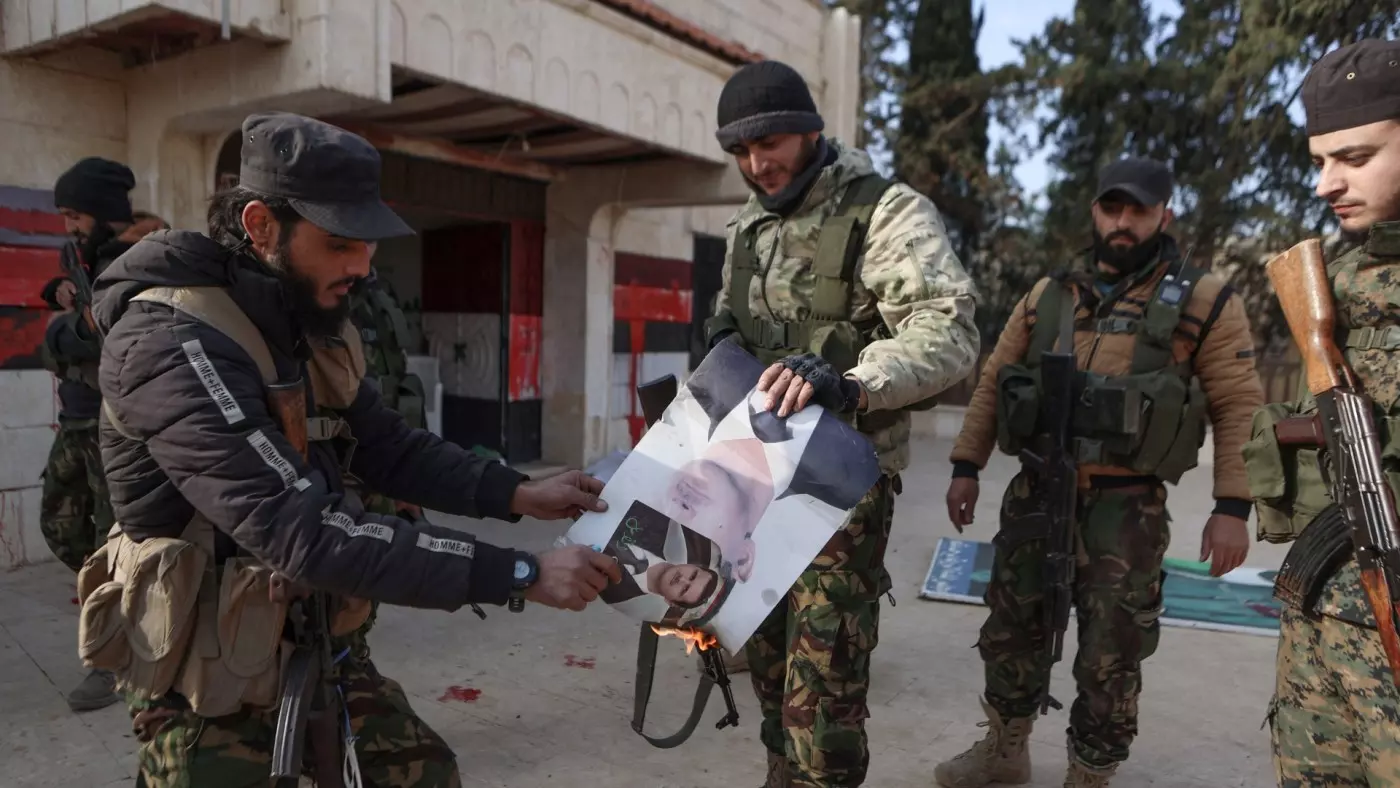
Since November 26, Syria has witnessed a major military escalation in the northwest of the country. Hay’at Tahrir al-Sham (HTC), formerly affiliated with Al Qaeda, in coordination with pro-Turkish groups, has launched an offensive called “Deterrence of Aggression.” The speed of this operation surprised many observers: in just three days, HTC and its allies penetrated deeply into Aleppo, the economic capital of Syria, under the control of the regime of Bashar al Assad, Syrian president, since 2016.
The offensive, carried out simultaneously on several fronts, allowed the rebels to capture around twenty cities and strategic positions, including the University of Aleppo, the police headquarters and the airport of that city. This advance was responded to by Russian and Syrian airstrikes, which on Saturday targeted the center of Aleppo for the first time since 2016, while Islamist organizations continued to advance towards Hama and claimed to have taken control of the city of Khan Sheikhoun. According to several sources, the HTC rebels have also taken control of the M5 highway, Syria’s most important transport artery, linking the north and south of the country and facilitating military and logistical movements. The loss of control of this highway by government forces considerably complicates their operations, making it difficult to transport troops, equipment and essential supplies.
This large-scale, well-coordinated offensive represents a significant advance for HTC (and Türkiye), which now controls key positions in a historically contested area. The speed and depth of the attack highlight the fragility of the forces of Bashar al-Assad’s government and its allies. However, this offensive raises other questions, especially in relation to minorities living in the region, such as the Kurds. Some sources suggest that more than 200,000 Kurds are now “surrounded” by “pro-Turkish” forces in Aleppo. Clashes are said to have already occurred this weekend between the Syrian Democratic Forces (SDF), dominated by Kurdish fighters, and pro-Turkish armed groups.
An “opportunistic” offensive that Türkiye will try to take advantage of
The lightning advance of the HTC and its allies in the Aleppo region comes at a time when pro-Iranian forces, particularly Hezbollah, are showing signs of fragility. For several months, Hezbollah, the main ground support of the Bashar al-Assad regime, has been redeploying part of its forces to face the Israeli offensive in southern Lebanon. Furthermore, recent Israeli attacks have weakened Iran’s military infrastructure in Syria, leaving a strategic vacuum in key regions. The death of an Iranian Revolutionary Guard general in Aleppo also illustrates the erosion of Iranian control in the area. HTC took advantage of this moment of weakness.
Although Turkey denies any direct support for the offensive, pro-Turkish rebel groups, grouped under the flag of the Syrian National Army (SNA), are actively participating in the operations. This collaboration highlights the ambivalence of Turkey, which, although ideologically opposed to the HTC, shares tactical objectives in the fight against the Syrian regime and its allies, in order to increase its influence over northern Syria.
For some analysts, there is no doubt that Türkiye is directly involved in this offensive. Kamran Bokhari, speaking about the threat Turkey poses to the Assad regime, states that “Syria and Turkey agree on issues such as the fight against Kurdish separatism, but more generally, Turkey is much more of a threat than an ally. “Turkish forces occupy large swaths of Syrian territory in the north. Ankara is the main supporter of the Syrian rebels. And more importantly, Assad does not want to distance itself from Iran and become vulnerable to another country with regional ambitions.” Erdogan sees a historic opportunity: “I didn’t know that Iran and Hezbollah would weaken so quickly [por la ofensiva israelí]. Its devastation was a historic opportunity that Türkiye simply could not pass up. The speed with which pro-Turkish forces were deployed suggests that Ankara had prepared for this opportunity well in advance. And the fact that they were able to take Aleppo so quickly probably reflects Iran’s weakening in the Levant.”
Turkey, governed by Recep Erdogan, is thus trying to fill the power vacuum created by the weakening of Iran in the country and trying to strengthen its influence in Syria, in the region and within the Sunni community. To achieve this, the Turkish government, despite its official statements and calls for moderation, appears willing to reignite the reactionary Syrian civil war.
Russia, in a delicate position
The offensive launched by Hay’at Tahrir al-Sham (HTC) and its pro-Turkish allies in northwestern Syria has ended the ceasefire signed in 2020 between Russia and Turkey. In response to this advance, Russia intensified its air strikes in the region. On November 29, Russian aviation carried out strikes against rebel positions in Idlib, marking a significant escalation of hostilities.
However, the effectiveness of the Russian response is limited by its military commitments in Ukraine, where a substantial portion of its air assets are deployed. This situation complicates Moscow’s ability to fully support Syrian regime forces in the face of the ongoing rebel offensive. Furthermore, already complex relations between Türkiye and Russia have been weakened by Türkiye’s position in the Ukrainian conflict. The Turkish government, while playing the role of mediator in deals such as grain exports across the Black Sea, also supplies Ukraine with Bayraktar TB2 drones, which have been used successfully against Russian troops. This double game irritates Moscow, which considers the deliveries as a provocation.
In the Syrian context, these differences amplify frictions. Türkiye, by supporting rebel groups such as the Syrian National Army (SNA), attempts to limit Russian and Iranian influence in northern Syria. In response, Russia is stepping up its attacks on rebel-held areas and sending a clear message to the Turkish government by bombing a pro-Turkish base located in a “safety zone” under Turkish control.
Is the Syrian civil war reignited?
The two countries that gain the most from this escalation in Syria are Türkiye and Israel. On Turkey’s part, this rebel offensive offers it a strategic opportunity to return to the 2019 borders provided for in the de-escalation agreements on Idlib, which had been established between Moscow and Ankara but violated by the Syrian regime in March 2020. If Turkey manages to expand its territory of influence in northwest Syria, it would consequently weaken the dominance of the Kurdish forces of the People’s Protection Units (YPG, for its acronym in Kurdish), supported by Washington.
For Israel, a reduction in the Iranian presence in Syria and an advance by Hay’at Tahrir al-Sham (HTC) in the region could limit vital supply lines feeding Hezbollah in Lebanon. Israel is trying to prevent at all costs the reconstruction of Hezbollah after the beheading of its military leadership and the assassination of Hassan Nasrallah. The HTC’s seizure of strategic routes, such as those linking Aleppo with Damascus, will be a guarantee for Israel that Hezbollah will not be able to reinforce its military capabilities in the near future.
Finally, a withdrawal of Iranian military positions in Syria would also represent a major advance for Israel in its fight for regional influence. Since October 7, 2023, Israel has intensified its military operations on several fronts, seeking to redraw the balance of power in the region and assert itself as the dominant power in the Middle East. A reduction of Iranian influence in Syria fits perfectly into this strategy.
However, in the medium term, the strengthening of Sunni armed currents does not represent a “relief” for Israel either. These organizations could quickly turn against Israel in one way or another. The strengthening of pro-Turkish militias could give a central role to Turkish President Erdogan, who is a more favorable interlocutor for the interests of the Jewish State. However, even if Erdogan knows how to reconcile his interests with those of Israel, this is no guarantee of tranquility for Netanyahu. A likely scenario seems to be the reactivation of the Syrian civil war. According to Kamran Bokhari: “The rebels have always been very divided, which limits their ability to take Damascus and its strongholds on the Mediterranean coast. Even if they manage to overthrow the regime this time, the country will be plunged into a state of anarchy with different factions. armed forces supported by different regional powers”. This scenario could buy Netanyahu time, but it is difficult to know if it is the perspective that Israel and its Western allies want.
As for Russia, although it attempted to respond on Saturday, the country has been weakened by the war in Ukraine and does not appear willing to deploy troops to Syria. However, such an escalation will force Russia to protect at least its Tartous naval base and guarantee the security of these strategic areas.
Following this offensive and the resumption of fighting and violence in Syria, the prospects for workers, youth, the entire exploited classes and oppressed sectors of the country (and the region) are bleak. Videos of horrific war crimes have emerged over the weekend, reminiscent of the worst moments of the civil war. From beginning to end, the Syrian civil war has been a reactionary conflict, instrumentalized by regional powers such as Iran, Russia and Turkey to promote their own interests, and in which none of the various protagonists carried in any way a progressive agenda – with the possible exception of the Kurdish fighters, who were however partly co-opted by North American imperialism. If it is relaunched, nothing good will come of it for the workers of Syria and the region.
Source: www.laizquierdadiario.com

